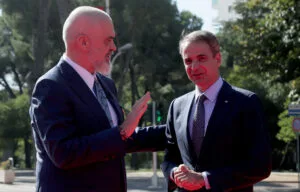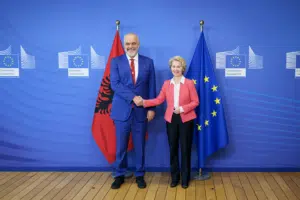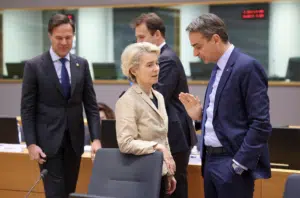Brussels – If the case of newly-elected Italian MEP Ilaria Salis ENDED in a less traumatic than expected way, between Greece and Albania, the judicial game over the parliamentary immunity of a new Greek member of the European Parliament, sentenced in March in first instance to two years in prison for buying and selling votes in the May 2023 municipal elections, has just begun. The ethnic Greek mayor of the Albanian municipality of Himarë, Fredis Beleri, was the third most voted candidate in Greece in the June 9 European elections from the ranks of the ruling New Democracy party, and now the Special Court of Appeal in Tirana will make the final decision on his release from prison.

With more than 238,000 preferences, Beleri secured a place among the seven elected conservative MEPs (out of a total of 21 for Greece) and immediately after the definitive results announcement claimed his success in a “fight for democracy, the rule of law, freedom, and the dignity of citizens.” The one who for months has become one of the most controversial political figures in Albanian-Greek relations denounced Tirana for the “unimaginable conditions for a country that wants to join the European family” and thanked the Greek prime minister, Kyriakos Mitsotakis, for “the opportunity to be a candidate, something for which I will always be grateful.” At this point, however, it will be an Albanian Special Court of Appeal that will make the final decision next Tuesday (June 25), with the not unlikely scenario of a judicial clash with Athens, to the point that Beleri anticipated his intention to appeal to the European Court of Human Rights: “I know that the judicial system in Albania is controlled by Edi Rama.”
The Beleri case between Greece and Albania
Beleri’s case had already emerged as a point of friction even at the European tables during the informal dinner between the heads of the EU institutions and the leaders of the Western Balkans, Ukraine, and Moldova staged in Athens at the end of August last year. Missing from that meeting was only the Albanian Premier, Edi Rama, who was not invited precisely because of tensions between Greece and Albania over the detention of the elected mayor of Himarë, who was never able to swear in as he had been detained in jail for two days prior to the May 14 elections on charges of vote buying (the challenger and incumbent first citizen, Jorgo Goro, also went to jail for corruption). From that moment on, a diplomatic tug-of-war began between the Mitsotakis and the Rama governments, the former accused by Tirana of trying to influence an independent investigation into a figure associated with the 1994 armed insurrection of the Greek minority in Albania, the latter suspected by Athens of “human rights violations” and a “politically motivated” trial.

So far, the Greek government has failed to exert sufficient diplomatic pressure for Beleri’s release, and even the threats of negative consequences on Albania’s path to EU membership (with the negotiations started in July 2022) have not had the desired effect. Greece argues that the Beleri case should be seen as a European issue and not just a bilateral one—as it would concern respect for the rule of law and minority rights in a country aspiring to join the Union—but the forcing has annoyed some of the twenty-seven countries most in favour of accelerating the enlargement process, such as Germany. Hence, the Greek premier decided to take a more “original” route, and on April 15 came the officiality of Beleri’s nomination as the 25th candidate (out of 42) on the New Democracy electoral lists. “His nomination has a very strong symbolism, everyone who is really interested in the rights of the Greek ethnic minority in Albania understands that,” Mitsotakis had said two days later on the sidelines of the European Council in Brussels.

With Beleri’s election to the European Parliament, New Democracy shifts the centre of gravity of political discourse to the patriotic level, leveraging what has become a rhetorical battleground for Greek and Albanian nationalism. Technically, Tirana and Athens are still in a state of war (since 1940 when Albania was an Italian protectorate during World War II), and, despite the fact that the Treaty of Friendship, Cooperation, Good Neighborliness and Security has been in force since 1996, the two NATO members are experiencing escalating tensions on the diplomatic level, which also closely involve the EU institutions and the enlargement process.
English version by the Translation Service of Withub





![Enrico Letta [Bruxelles, 3 aprile 2025]](https://www.eunews.it/wp-content/uploads/2025/04/letta-120x86.png)